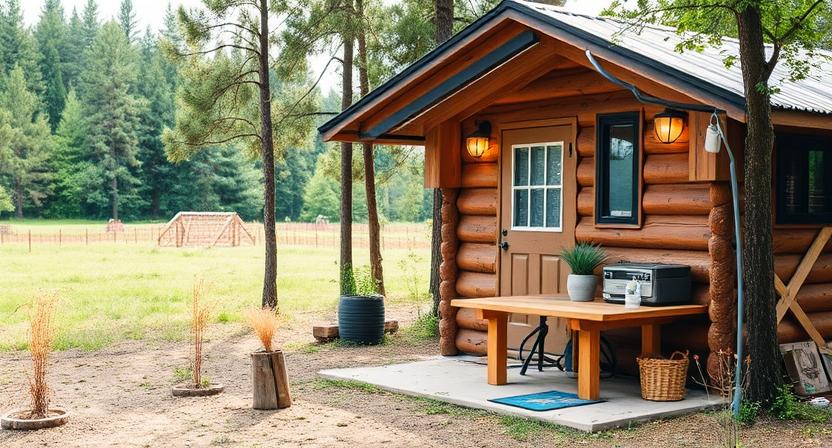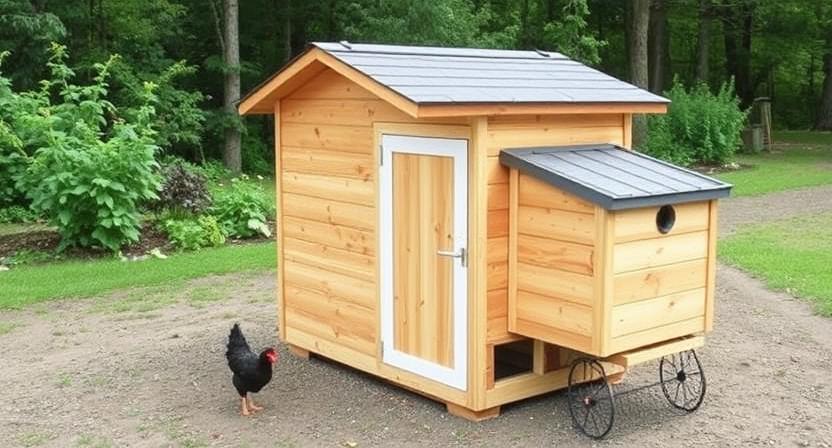Living Off the Grid: Practical Tips for Beginners

Benefits of living off the grid
Living off the grid offers a sense of independence and self-sufficiency that is hard to come by in traditional urban settings. Without relying on external sources for electricity, water, or food, individuals can feel empowered knowing that they have the skills and resources to sustain themselves. This lifestyle encourages a deep connection with nature and a greater appreciation for the environment, as individuals must be mindful of their consumption and waste generation.
In addition to the personal satisfaction that comes with self-reliance, living off the grid can also lead to financial savings in the long run. By reducing or eliminating utility bills and daily living expenses, individuals can free up more resources for other endeavors or investments. This financial freedom can provide a sense of security and peace of mind, knowing that one is not solely dependent on a fragile system for their basic needs.
• Living off the grid promotes independence and self-sufficiency
• Individuals feel empowered by not relying on external sources for electricity, water, or food
• Deep connection with nature and greater appreciation for the environment is encouraged
• Financial savings in the long run by reducing or eliminating utility bills and daily living expenses
• More resources freed up for other endeavors or investments
• Sense of security and peace of mind knowing one is not solely dependent on a fragile system
Understanding the concept of off-grid living
Off-grid living refers to a lifestyle choice where individuals rely on their own resources for basic needs such as electricity, water, and food, rather than being connected to public utilities. This self-sustainable approach allows people to live more independently and reduce their ecological footprint by minimizing reliance on traditional infrastructure. By disconnecting from the grid, individuals can embrace a simpler way of life that prioritizes self-sufficiency and environmental awareness.
Living off the grid involves making conscious decisions about energy consumption, waste management, and water usage. It requires individuals to adopt practices that promote sustainability and reduce reliance on external resources. By harnessing renewable energy sources, practicing conservation methods, and implementing efficient systems for water management, off-grid living not only empowers individuals to take control of their own needs but also encourages a deeper connection with nature and the environment.
• Off-grid living involves relying on own resources for basic needs
• Allows individuals to live more independently and reduce ecological footprint
• Disconnecting from the grid promotes self-sufficiency and environmental awareness
Living off the grid requires conscious decisions about energy consumption, waste management, and water usage. It entails adopting practices that promote sustainability and reduce reliance on external resources. By utilizing renewable energy sources, implementing conservation methods, and efficient water management systems, individuals can take control of their own needs while fostering a deeper connection with nature and the environment.
• Off-grid living involves making conscious decisions about energy consumption
• Requires adopting practices that promote sustainability
• Encourages a deeper connection with nature
Assessing your energy needs
Assessing your energy needs is a crucial step when transitioning to off-grid living. It involves calculating how much electricity you require on a daily basis to power your appliances, lights, and other necessities. By conducting an energy audit, you can determine the right size and type of renewable energy system to meet your specific energy demands.
Factors such as the number of occupants in your off-grid home, the types of electronics you use, and the climate of your location all play a role in determining your energy needs. It is essential to consider the fluctuations in energy consumption throughout the year and plan for energy storage solutions to ensure a reliable power supply during times of low renewable energy production. Taking the time to assess your energy needs thoroughly will help you design an efficient off-grid energy system that aligns with your lifestyle and values.
• Conduct an energy audit to determine daily electricity requirements
• Consider number of occupants, types of electronics, and climate in energy needs assessment
• Plan for fluctuations in energy consumption throughout the year
• Design efficient off-grid energy system aligned with lifestyle and values
Choosing the right location for off-grid living
When selecting the ideal location for off-grid living, it is essential to consider various factors that will directly impact your sustainability and overall living experience. One crucial aspect to evaluate is the availability of natural resources in the area, such as water sources, fertile land for agriculture, and sunlight for generating solar power. These resources are fundamental for meeting your basic needs and decreasing dependency on external sources.
Additionally, the geographical location should be taken into account when choosing a site for off-grid living. Factors such as climate, weather patterns, and potential natural hazards play a significant role in determining the feasibility and success of living off the grid. Ensuring that you can access or produce sufficient energy, handle extreme weather conditions, and mitigate risks from environmental factors are essential considerations when deciding on the right location for your off-grid lifestyle.
• Access to water sources, fertile land for agriculture, and sunlight for solar power is crucial
• Decrease dependency on external sources by utilizing natural resources effectively
• Evaluate climate, weather patterns, and potential natural hazards in the area
• Ensure access to sufficient energy and ability to handle extreme weather conditions
• Mitigate risks from environmental factors to ensure a successful off-grid lifestyle.
Selecting the appropriate off-grid housing
When choosing the right off-grid housing, it is crucial to assess your specific needs and preferences. Consider factors such as the size of the property, the type of terrain it is located on, and the availability of natural resources like water and sunlight. Additionally, think about the amount of maintenance and upkeep you are willing to commit to, as different types of off-grid housing require varying levels of care.
One key aspect to consider when selecting off-grid housing is the durability and resilience of the structure. Look for materials that are long-lasting and well-suited for off-grid living conditions, such as timber frame construction or earthbag building. It is also important to ensure that the design of the house maximizes energy efficiency and can accommodate off-grid systems for water, heating, and electricity. By taking these factors into account, you can find the perfect off-grid housing that aligns with your sustainable living goals.
• Assess specific needs and preferences
• Consider property size, terrain, and natural resources
• Think about maintenance and upkeep commitment
• Look for durable and resilient materials
• Ensure energy efficiency in design
• Accommodate off-grid systems for water, heating, and electricity
Creating a sustainable water source
Ensuring a sustainable water source is a critical aspect of off-grid living. A reliable supply of clean water is essential for daily activities such as drinking, cooking, and sanitation. Depending on the location and climate, off-gridders may need to explore various methods to collect and store water, such as rainwater harvesting, well drilling, or utilizing natural springs.
Rainwater harvesting is a popular choice for many off-grid enthusiasts as it allows for the collection of water during the rainy season to be used throughout drier periods. Implementing an efficient rainwater collection system involves the installation of gutters, downspouts, and storage tanks. Additionally, utilizing water filtration and purification systems is crucial to ensure that the harvested rainwater is safe for consumption and other household needs.
• Rainwater harvesting is a sustainable method for off-grid living
• Installation of gutters, downspouts, and storage tanks are essential for efficient rainwater collection
• Water filtration and purification systems must be used to make harvested rainwater safe for consumption
Generating your own electricity
Generating your own electricity off the grid is a crucial aspect of self-sufficiency. Solar panels are a popular choice for many off-grid enthusiasts, harnessing the power of the sun to generate electricity. These panels are typically mounted on rooftops or in open spaces to maximize sun exposure. Additionally, wind turbines can be utilized to generate electricity through the power of wind. By combining these renewable energy sources, off-grid individuals can create a reliable electricity supply to meet their daily needs.
In addition to solar and wind power, hydroelectric systems can also be utilized to generate electricity off the grid. By harnessing the power of flowing water, these systems can produce a consistent source of energy. Off-grid individuals can set up micro-hydro systems in nearby streams or rivers to generate electricity for their homes. It is essential to assess the natural resources available in the chosen location to determine the most suitable method for generating electricity off the grid.
• Solar panels are a popular choice for off-grid electricity generation
• Wind turbines can also be used to harness wind power
• Combining renewable energy sources like solar and wind can create a reliable electricity supply
• Hydroelectric systems utilizing flowing water can provide consistent energy
• Micro-hydro systems in streams or rivers can generate electricity for off-grid homes
Implementing waste management solutions
Waste management is a crucial aspect of off-grid living that requires careful consideration and planning. One effective solution is composting organic waste to create nutrient-rich soil for gardening. By separating organic materials from other waste streams, you can minimize the amount of trash that needs to be disposed of, while also contributing to a sustainable food production system.
In addition to composting, incorporating recycling practices into your daily routine can significantly reduce the amount of waste that ends up in landfills. Setting up designated recycling bins for paper, plastic, glass, and metal items can help streamline the process and make it easier to sort materials accordingly. By taking proactive steps to manage waste responsibly, off-grid individuals can minimize their environmental impact and promote a more sustainable way of living.
• Composting organic waste can create nutrient-rich soil for gardening
• Separating organic materials from other waste streams minimizes trash disposal
• Recycling practices reduce waste ending up in landfills
• Setting up designated recycling bins for paper, plastic, glass, and metal items helps streamline the process
Growing your own food
To successfully grow your own food off the grid, it is crucial to assess the climate and soil conditions of your chosen location. Understanding the specific needs of the plants you intend to cultivate will help you determine the best time for planting and harvesting. By investing time in researching and planning your garden, you can maximize your chances of a successful harvest. Additionally, incorporating companion planting techniques can help naturally repel pests and encourage plant growth, creating a symbiotic ecosystem within your garden.
In order to sustainably grow your own food off the grid, it is important to prioritize water conservation and soil health. Implementing rainwater harvesting systems or utilizing greywater for irrigation can help reduce reliance on external water sources. Furthermore, practicing organic gardening methods and composting organic waste can enrich the soil, leading to healthier and more resilient crops. By fostering a self-sustaining food production system, you can enjoy fresh and nutritious produce while minimizing your environmental impact.
• Assess the climate and soil conditions of your location
• Understand the specific needs of plants for planting and harvesting
• Research and plan your garden for a successful harvest
• Incorporate companion planting techniques to repel pests and encourage growth
• Prioritize water conservation and soil health in gardening
• Implement rainwater harvesting systems or use greywater for irrigation
• Practice organic gardening methods and composting organic waste
• Foster a self-sustaining food production system for fresh produce
Learning essential survival skills
Learning essential survival skills is a crucial aspect of off-grid living. With the possibility of being isolated from conventional help and resources, it becomes paramount to acquire knowledge in first aid, navigation, shelter-building, and food foraging. These skills not only enhance self-sufficiency but also instill a sense of confidence in handling unexpected situations that may arise in a remote setting.
In addition to physical survival skills, it is equally important to learn how to stay calm and composed during emergencies. Developing a mindset focused on problem-solving and adaptability can make a significant difference in challenging scenarios. Whether it’s knowing how to start a fire without matches or understanding basic self-defense techniques, the ability to think quickly and rationally can be the key to overcoming obstacles in an off-grid lifestyle.
• First aid: Knowing how to administer basic medical care in emergencies
• Navigation: Understanding how to read maps and use a compass for direction
• Shelter-building: Mastering techniques for constructing temporary shelters in the wilderness
• Food foraging: Identifying edible plants and sources of food in the wild
• Staying calm: Practicing mindfulness and stress management techniques during crises
• Problem-solving: Developing critical thinking skills to address unexpected challenges effectively
• Adaptability: Being flexible and open-minded when facing unforeseen circumstances
• Self-defense: Learning basic techniques to protect oneself from potential threats
Securing sources of income
When opting for an off-grid lifestyle, securing sources of income becomes crucial to sustain this independent way of living. One common approach is to explore remote job opportunities that can be done online, such as freelancing, virtual assistance, or e-commerce. These options allow you to earn a living while being geographically flexible, aligning well with the off-grid lifestyle.
Another avenue to consider is creating a home-based business that caters to the needs of both the off-grid community and visitors seeking off-grid experiences. This may include offering services like off-grid consultations, sustainable living workshops, or selling eco-friendly products. By tapping into the growing interest in sustainable living and off-grid practices, you can not only generate income but also contribute positively to the community you are a part of.
• Freelancing
• Virtual assistance
• E-commerce
Creating a home-based business:
• Off-grid consultations
• Sustainable living workshops
• Selling eco-friendly products
Establishing communication methods
Effective communication is essential for off-grid living, especially when traditional modes of communication may not be readily available. In remote locations, where landline phones and internet connections are scarce, it is crucial to explore alternative methods to stay connected with the outside world. One option is to invest in satellite phones or two-way radios, which can provide reliable communication even in areas with limited infrastructure. Additionally, setting up a network of signal repeaters or antennas can help amplify signals and improve connectivity in off-grid environments.
Another important aspect of establishing communication methods off the grid is to develop a system for emergency communication. In case of unforeseen circumstances or emergencies, having a well-defined protocol in place can be life-saving. This may include establishing designated communication points, creating emergency contact lists, and practicing emergency drills to ensure that all members of the off-grid community are prepared to respond swiftly and effectively when needed. By prioritizing communication planning, off-grid residents can enhance their safety and security in remote settings.
• Invest in satellite phones or two-way radios for reliable communication
• Set up a network of signal repeaters or antennas to improve connectivity
• Develop a system for emergency communication with designated points and contact lists
• Practice emergency drills to ensure swift and effective response
By prioritizing communication planning, off-grid residents can enhance their safety and security in remote settings. Effective communication methods are crucial for staying connected with the outside world and responding effectively to emergencies when living off the grid.
Dealing with emergencies off the grid
Emergencies can arise unexpectedly when living off the grid, requiring a proactive approach to ensure safety and preparedness. One key aspect to consider is establishing a comprehensive first aid kit that includes essential supplies like bandages, antiseptic ointment, pain relievers, and tools for minor medical procedures. In addition, it’s vital to acquire basic knowledge of first aid techniques to address common injuries and health concerns that may occur in remote areas without immediate access to medical facilities.
Furthermore, maintaining open lines of communication with nearby off-grid neighbors or communities can be invaluable during emergencies. Establishing a network of support and communication channels can facilitate quick responses to critical situations such as natural disasters, medical emergencies, or unforeseen events. Collaborating with fellow off-gridders to share resources, information, and assistance can enhance overall safety and resilience in challenging circumstances.
• Establish a comprehensive first aid kit with essential supplies
• Acquire basic knowledge of first aid techniques
• Maintain open lines of communication with off-grid neighbors or communities
• Establish a network of support and communication channels
• Collaborate with fellow off-gridders to share resources, information, and assistance
Navigating off-grid social interactions
When living off the grid, social interactions can differ significantly from those in more traditional settings. Meeting like-minded individuals who share your values and beliefs about sustainable living can be a rewarding experience. Communities of off-grid dwellers often come together to support one another, share resources, and exchange knowledge on topics such as renewable energy, water conservation, and organic gardening.
However, navigating social interactions off the grid may also present challenges. As off-grid living typically involves a more solitary lifestyle, it’s essential to find a balance between enjoying your solitude and connecting with others when needed. Building strong relationships with neighbors or fellow off-gridders can provide a sense of community and support that is crucial when facing the unique challenges of living off the grid.
• When living off the grid, social interactions can differ significantly from those in more traditional settings.
• Meeting like-minded individuals who share your values and beliefs about sustainable living can be a rewarding experience.
• Communities of off-grid dwellers often come together to support one another, share resources, and exchange knowledge on topics such as renewable energy, water conservation, and organic gardening.
• Navigating social interactions off the grid may also present challenges due to the solitary lifestyle it often entails.
• Finding a balance between enjoying solitude and connecting with others when needed is essential for off-grid living.
• Building strong relationships with neighbors or fellow off-gridders can provide a sense of community and support crucial for facing unique challenges.
Maintaining mental and emotional well-being
Coping with the solitude and self-reliance of off-grid living can be both rewarding and challenging. It is essential to prioritize mental and emotional well-being to ensure a fulfilling experience. Engaging in mindfulness practices such as meditation or yoga can help foster inner peace and manage stress in the midst of the off-grid lifestyle. Additionally, maintaining a sense of purpose through hobbies, creative outlets, or participating in community-building activities can contribute to a sense of fulfillment and connection to the surrounding environment.
Creating a routine and structure can provide stability and a sense of control in an off-grid setting where daily tasks may vary. Establishing a schedule for daily chores, leisure activities, and personal time can help maintain a sense of balance and prevent feelings of overwhelm or isolation. It is also important to stay connected with loved ones and support networks through regular communication, whether it be through mail, phone calls, or scheduled visits. Building and sustaining relationships can provide emotional support and a sense of belonging, helping to alleviate feelings of loneliness that may arise in the isolated nature of off-grid living.
• Engaging in mindfulness practices such as meditation or yoga
• Maintaining a sense of purpose through hobbies and creative outlets
• Participating in community-building activities
• Creating a routine and structure for daily tasks
• Establishing a schedule for chores, leisure activities, and personal time
• Staying connected with loved ones through regular communication
• Building and sustaining relationships for emotional support
Connecting with like-minded off-grid communities
One of the key aspects of living off the grid is the opportunity to connect with like-minded individuals who share a similar mindset towards a self-sustainable lifestyle. Being part of an off-grid community allows you to exchange knowledge, resources, and support with others who understand the challenges and rewards of living independently of mainstream infrastructure. These connections can help foster a sense of belonging and camaraderie as you navigate the unique experiences of off-grid living.
Engaging with like-minded off-grid communities can also provide valuable insights and tips for improving your self-sufficiency practices. Whether it’s sharing ideas for renewable energy solutions, sustainable food production methods, or waste management strategies, interacting with others who are also committed to living off the grid can inspire innovation and creativity in your own lifestyle choices. By collaborating with individuals who have a shared passion for sustainability, you can contribute to a network of support that enhances your off-grid journey.
• Connecting with like-minded off-grid communities provides an opportunity to exchange knowledge, resources, and support
• Being part of an off-grid community fosters a sense of belonging and camaraderie
• Engaging with like-minded individuals can offer valuable insights and tips for improving self-sufficiency practices
• Interacting with others committed to living off the grid can inspire innovation and creativity in lifestyle choices
• Collaborating with individuals who share a passion for sustainability contributes to a network of support that enhances the off-grid journey
Budgeting for off-grid living
Creating a budget for off-grid living is a crucial step in ensuring your sustainability and independence from traditional utilities. The initial costs of transitioning to off-grid living may include purchasing solar panels, water filtration systems, and sustainable housing options. It is important to carefully research the expenses associated with off-grid living to accurately budget for ongoing maintenance and upgrades. Implementing a detailed financial plan will help you track expenses, prioritize investments, and adjust your budget as needed to maintain your off-grid lifestyle. By establishing a comprehensive budget, you can effectively manage your resources and maximize the benefits of living off the grid.
• Research the costs associated with transitioning to off-grid living
• Consider purchasing solar panels, water filtration systems, and sustainable housing options
• Create a detailed financial plan to track expenses and prioritize investments
• Adjust your budget as needed to maintain your off-grid lifestyle
• Maximize the benefits of living off the grid by effectively managing your resources
Adapting to off-grid living challenges
Living off the grid comes with its unique set of challenges that require adaptability and resilience. One of the main challenges of off-grid living is the unpredictability of nature. Weather conditions, such as extreme temperatures or natural disasters, can greatly impact daily life and require quick thinking and preparation to overcome.
Another challenge is the limited access to resources and services that are taken for granted in urban areas. From healthcare facilities to grocery stores, off-grid living may require individuals to find alternative solutions or learn new skills to meet their needs independently. Adapting to these challenges involves careful planning, innovative thinking, and a willingness to embrace a simpler way of life.
• Living off the grid requires adaptability and resilience
• Unpredictable nature, such as extreme weather conditions or natural disasters, can greatly impact daily life
• Limited access to resources and services like healthcare facilities and grocery stores
• Off-grid living may require individuals to find alternative solutions or learn new skills independently
• Adapting to challenges involves careful planning, innovative thinking, and embracing a simpler way of life
Embracing a minimalist lifestyle
Embracing a minimalist lifestyle involves simplifying your possessions and focusing on what truly adds value to your life. By decluttering your living space and letting go of unnecessary items, you can create a more serene and organized environment. Minimalism encourages mindfulness in your consumption habits, prompting you to be intentional about what you bring into your home.
When adopting a minimalist lifestyle, you may find yourself more aware of the resources you consume and the impact your choices have on the environment. By prioritizing quality over quantity and embracing a less materialistic mindset, you can reduce your carbon footprint and contribute to a more sustainable way of living. Minimalism can also bring a sense of freedom and contentment as you learn to find joy in experiences and relationships rather than material possessions.
• Embracing a minimalist lifestyle involves simplifying your possessions and focusing on what truly adds value to your life.
• By decluttering your living space and letting go of unnecessary items, you can create a more serene and organized environment.
• Minimalism encourages mindfulness in your consumption habits, prompting you to be intentional about what you bring into your home.
When adopting a minimalist lifestyle, you may find yourself more aware of the resources you consume and the impact your choices have on the environment.
By prioritizing quality over quantity and embracing a less materialistic mindset, you can reduce your carbon footprint and contribute to a more sustainable way of living.
Minimalism can also bring a sense of freedom and contentment as you learn to find joy in experiences and relationships rather than material possessions.
Celebrating the freedom of off-grid living.
Living off the grid offers a profound sense of freedom that is unparalleled by traditional urban or suburban lifestyles. It provides individuals with the autonomy to make decisions based on their own values and beliefs, free from the constraints of society’s expectations. The ability to disconnect from the constant noise and distractions of modern life allows for a deeper connection with nature and a clearer focus on what truly matters.
In the simplicity of off-grid living, there is a liberation from consumerism and the pursuit of material possessions. Instead of being defined by what you own, the emphasis shifts towards experiences, relationships, and personal growth. This shift in mindset fosters a greater appreciation for the natural world and a more sustainable way of living, ultimately leading to a more fulfilling and enriching existence.
• Living off the grid allows individuals to make decisions based on their own values and beliefs
• Disconnecting from modern life’s distractions fosters a deeper connection with nature
• Off-grid living promotes a shift away from consumerism towards experiences and relationships
• Emphasis on sustainability leads to a more fulfilling existence




